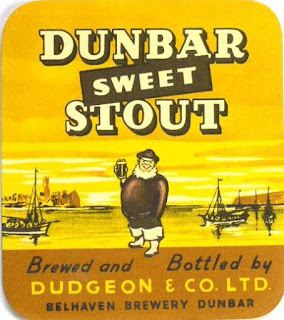This trend to ever weaker and sweeter Stouts continued, reaching its ridiculous peak after WW II.
Some of these beers are so weak, they could have legally been sold to children, being around the same strength as shandy. Did people drink such beers straight? Because if you did, you weren’t going to have a very merry evening down the pub.
McEwan’s Imperial Stout is really a joke, being under 3% ABV. Is this the weakest Imperial Stout ever brewed? Sweet Stouts were brewed elsewhere in the UK, but never as ridiculously weak and poorly-attenuated as the most extreme Scottish examples.
| Scottish weak bottled Stout after WW II | |||||||
| Year | Brewer | Beer | Price per pint (d) | OG | FG | ABV | App. Atten-uation |
| 1949 | Aitken | Stout | 1038.5 | 1020 | 2.38 | 48.05% | |
| 1948 | Belhaven | No. 1 Stout | 1035 | 1011 | 3.11 | 68.57% | |
| 1949 | Belhaven | No. 1 Stout | 1035.5 | 1015.5 | 2.58 | 56.34% | |
| 1949 | Blair | Invalid Stout | 1035 | 1016 | 2.45 | 54.29% | |
| 1948 | Maclachlan | Stout | 1032 | 1009.5 | 2.91 | 70.31% | |
| 1949 | McEwan | Imperial Stout | 1039.5 | 1017 | 2.90 | 56.96% | |
| 1947 | Tennent | Stout | 13 | 1030.7 | 1018.18 | 1.61 | 40.78% |
| 1948 | Tennent | Stout | 1030 | 1015.5 | 1.86 | 48.33% | |
| 1949 | Tennent | Stout | 1032 | 1017.5 | 1.86 | 45.31% | |
| 1949 | Tennent | Stout | 15 | 1034.9 | 1018.3 | 2.13 | 47.56% |
| 1948 | Younger, Geo | Extra Stout | 1036.5 | 1017.5 | 2.44 | 52.05% | |
| Sources: | |||||||
| Thomas Usher Gravity Book held at the Scottish Brewing Archive, document number TU/6/11. | |||||||
| Whitbread Gravity book held at the London Metropolitan Archives, document number LMA/4453/D/02/002. | |||||||

Interesting. I've been fighting the cause of "Imperial Russian" Doesn't Necessarily Mean "Russian Empire" ('Russian' meant 'the style we exported to Russia', 'Imperial' meant 'the good stuff'), but it looks as if I may need to open a second front, "Imperial" Doesn't Necessarily Mean "Strong".
ReplyDeleteOn the other hand, both of those bits of pedantry contrast our modern misconceptions with the good old days when everyone knew that "Imperial Russian" didn't have anything to do with the Romanovs (and "Imperial" didn't necessarily mean "loopy juice"), and that may be over-optimistic. But you would certainly have been disappointed if you ordered a half of that Imperial Stout expecting a skull-splitter.